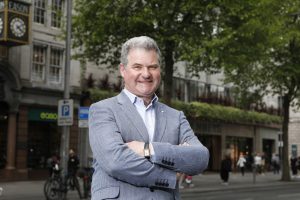DublinTown to begin consultation regarding City Council’s Draft Traffic Plan

Richard Guiney, chief executive officer, DublinTown
Dublin city centre business lobby group, DublinTown, is to begin an in-depth consultation process with its 2,500 members regarding the City Council’s Draft Traffic Plan.
The plan says it will also be taking onboard the views of its members’ customers as part of its submission to the City Council’s public consultation on the radical plan, which proposes a ban on cars in several areas.
Under the City Council and National Transport Authority plan, from next year sections of the North and South Quays at Bachelor’s Walk and Aston Quay would be reallocated for walking and cycling.
New traffic arrangements are proposed along Westland Row, this would allow further space for walkers and cyclists on Pearse Street, Tara Street, Beresford Place and Gardiner Street.
Traffic would be removed from Parliament Street entirely and a plaza constructed at either Custom House Quay or Beresford Place.
A 30km/h speed limit would be introduced along all roads in the centre of the capital, and an exploration of alternative uses of road space at night and weekends.
DublinTown, the collective voice of businesses in Dublin city centre, said its in-depth consultation process would begin shortly.
Chief executive officer, Richard Guiney, DublinTown, said: “While there must be a radical reduction of vehicle movement to achieve the target reduction in transport emissions, this will not happen if car drivers do not opt for alternatives. Otherwise, cars are merely redirected from the city centre.
“We need to upgrade our public transport. Again, that’s kind of obvious, but it’s not going to happen next week. Certainly anybody who’s advocating that they don’t invest in public transport, don’t invest in things like the metro or the upgrades to the DART system. I mean, they’re just not with the programme, those things absolutely have to happen. And they have to happen as quickly as possible. Rather than being a delay, I think that should be speeded up and delivered because we are not going to meet our climate change emissions targets if we don’t make those investments.”
Guiney continued: “I think what should have happened is, there should have been far more work with the likes of ourselves and business groups and residence groups in the planning stage of this. We didn’t have that chance to input into it. But it’s very, very significant in terms of the plan before it was announced. I think you’re better off solving problems before they surface. I think that there’s evidence to us that the public have been lost in some of these arguments and that could be catastrophic. There’s no point in having 40% of people doing the right thing, if we’re going to make the decisions that are required, we’re going to need far more than that.”








